 |
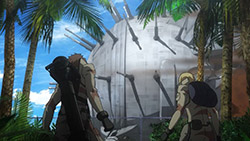 |
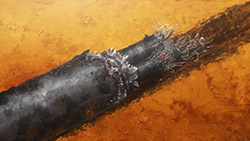 |
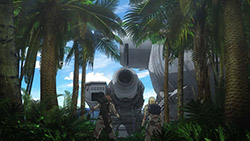 |
 |
 |
 |
 |
 |
 |
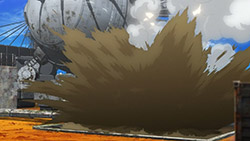 |
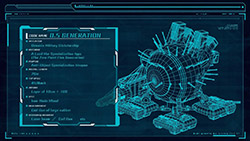 |
 |
 |
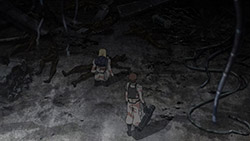 |
 |
 |
 |
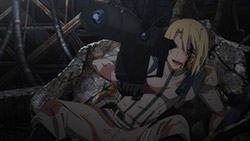 |
 |
 |
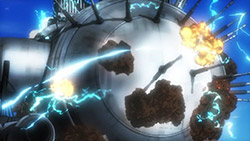 |
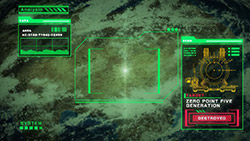 |
 |
 |
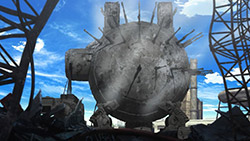 |
 |
 |
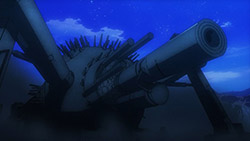 |
 |
 |
 |
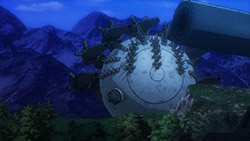 |
 |
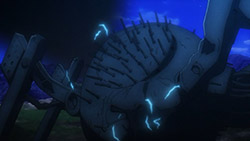 |
 |
 |
 |
 |
「蟻とキリギリスの戦争 オセアニア軍事国攻略戦 III」 (Aritokirigirisu no Sensou Oseania Gunji-koku Kouryaku-sen III)
“The War of the Any and the Grasshopper The Invasion of the Oceanian Military State III”
Ah. So that’s what this series is about. Some optimistic signs for Heavy Object’s future.
The Section Where Stilts Rants
The fundamental misunderstanding this story seems to hold for the human race is staggering. What I mean to say is: Somebody is wrong on the internet in an anime, and I cannot let this stand! (i.e. I’m about to go off on another semi-tangential series of rants. Don’t worry, this is the fun part.)
Councilor Flide (Oobayashi Ryuusuke) was the main mouthpiece for the prevailing worldview during this episode, and so much of what he says is wrong wrong wrong! Take his fallacious assumption: “We have one Object and they have three, so we’ll surrender.” Pardon me while I consider for half a nanosecond how history actually plays out—and then laugh my balls off.
*Takes a deep breath*
PFFFF—BWAHAHAHAHAHAHAHAHAHAHAHAHAHA!
*catches breath* Ahem. Which is to say, WRONG! That’s never been how war has functioned, not even in ancient times where the military situation more closely mirrored what Heavy Object is trying to evoke (persistent, “clean” warfare that mostly spared the homefront in the actual battles). Smaller armies have often beaten larger, more technologically advanced armies. Sure, the Romans had a good time of it, they dominated the world for a long time, but a quick search of Wikipedia shows that Rome was sacked six fuckin’ times, mostly by less sophisticated “barbarians.” Sure, once in a while a side surrendered without conflict, but usually they had at least one battle to see how things were going to shake out. That’s what war was for, seeing who was stronger, and numbers (and technology) are only a single piece of that equation. Strategy, tactics, the comparative toughness of your national character, even which people want it more all count for as much, if not more.
To posit that there’s such a world where humans would simply run the numbers and surrender if they’re at a disadvantage is to misunderstand what human beings are like on an elemental level. We’re contrary, prideful sons of bitches, and we believe in miracles. Which is another thing! It doesn’t take someone like Qwenthur and Havia blowing up a couple of Objects to make people believe in the long shot. That’s baked into our nature, or at least into many of our cultures. We love the underdogs, the come-from-behind victors. From Prometheus stealing fire from the gods and David defeating Goliath, all the way through history to the anime we so enjoy today (Heavy Object very much included), we love to believe in the underdog. That won’t go away.
AND ANOTHER THING! (Can’t stop, won’t stop.) Councilor Flide misunderstands how ideas work. Even if the idea that saboteurs are a useful thing that should be employed on Objects were somehow not thought of until Qwenthur and Havia (which is utter bullshit, but stay with me), once that idea gets out, it doesn’t matter if Qwenthur and Havia die. The idea is out there, and ideas are much harder to kill than human beings. This is what Seth Godin would call an ideavirus, also known as an intellectual contagion. Once it’s out there, the idea infects people, and you can’t stuff it back into pandora’s box. (A historical example: The spread of socialism, particularly after the Russian Revolution, which created an entire nation of infected which spread the intellectual contagion. Today you might point to the spread of fundamentalist Islam, which even infects Westerners on occasion.) The one good thing about this misconception, though: It’s such a common one throughout history that real people have believed in that it feels more like a flaw in Councilor Flide’s character, rather than a on Heavy Object’s part.
The Section Where Stilts Raves
Now that I’ve gotten my philosophical ranting out of the way, an admission: This is quite possibly my favorite non-banter-or-fanservice-based episode of Heavy Object. The gambit Qwenthur and Havia used to defeat the 0.5th Gen Object actually felt believable, it was thrilling, and it was instantly understandable enough to work without bucket-loads of exposition. Overload the reactor (trope, I think … there are a lot of related ones), make it go critical (trope), use water to conduct electricity, I’m following you. Plus there’s the fact that, as a 0.5th Gen Object, it makes sense that it would have serious flaws that Qwenthur and Havia could exploit. I also liked how banged up Qwenthur and Havia got, because it makes them feel like they really had to work for it, and it was a near-run thing. All in all, I legitimately enjoyed the actual conflict for once, and even though it was probably too convenient that the Object starting up fried all the enemy soldiers, but the electricity system still worked, and it didn’t just slag that when it shot at Qwenthur, and I’m not sure if the water would conduct all that electricity straight to the other cable quite so well, BUT HEY let’s stop thinking about it. It was cool for once, and approached making sense. I’ll take it.
The Section Where Stilts Wonders
I wonder—were the preceding seven episodes setting up for this one, where Qwenthur and Havia espouse that the old world order is stupid and they’re going to defy it? Because they should. “Safe/clean” war is bullshit, no war is smart, you shouldn’t let innocents be slaughtered in front of you, and the idea of going back to the old way is naive at best. Heavy Object’s problem, then, might be that it had to set up its world in a stupid way to get to this point, where the protagonists espouse a better way to do things—which happens to be more or less how we do things now. A lean back toward modern, total war.
The problem is that this is sci-fi based on Earth. If this were fantasy, and taking place in a more technologically primitive time, we would totally buy that they’re still under the illusion that “clean war” is a thing. Or if this was sci-fi but on an alternate world (even if that world was filled with humans, though it’d probably work better if it was a Star Wars-style example of suspiciously parallel evolution), then it could work because we could believe that they somehow skipped all those lessons up until this time. But since we know that conflicts like the American Civil War, the Russo-Japanese War, WWI, WWI, The Vietnam War and all the others since we started putting metal on our ships and conscripting every 18-year-old boy we could get our hands on happened, this feels like history regressed, and history very seldom regresses. It requires a loss of knowledge, like I said in a previous post, but they’ve already shown that they have the internet, so fat chance of that happening.
The essential world is deeply, irrevocably flawed, but if they proceed from here on out to dismantle that and build something that makes more sense, that could work. I still can’t exactly suggest the series since the foundation is such a mess, but at least it might get better for those of us who have fought this far through the dumb.
Looking Ahead
I forgot to mention, but Ohime-sama’s Baby Magnum was finally useful! I like this, because it builds upon one of the themes I touched on earlier—that of experience, tactics, and toughness triumphing over sheer numbers or technological prowess. Once again, something that’s fucking obvious to most people, especially anyone who are aware of battles such as the Battle of Thermopylae (that’s Leonidas and those 300 Spartans—there were actually other Greeks there too, but let’s not screw up a good story). Experience is a wonderful force multiplier, since the best weapons don’t matter if you don’t know how to use them. Like I said before, it they mean to continue with more themes like that rather than the stupid misconceptions this world is built on, Stilts will be happier. Also, fanservice and banter pureezu.
tl;dr: @StiltsOutLoud – The gambit was exciting, & the new themes may improve the story’s still-stupid foundation. Cautiously optimistic #heavyobject 08
Random thoughts:
- Counciler Flide needs to read the Evil Overlord List. Never explain your masterstroke to those who are about to be dead, and especially don’t do it over the radio. Just jam them, give your orders, and shut the hell up. Dude deserved to get sucker punched.
My first novel, Wage Slave Rebellion, is available now. (More info—now in paperback!) Sign up for my email list for a FREE sequel novella. Over at stephenwgee.com, the last four posts: Stephen, what is best in life?, It depends, Momentum & mental space, and The best content is in email
Preview
 |

I think it is implied that on a societal level it has been ingrained into people that objects are all powerful. After a (near) century of that i could see why people treat them as unstoppable juggernauts.
Yes, I understand that. But you should also understand how fuckin’ daft that is. The entire time up to Heavy Object’s present day people would be trying to sabotage, undermine, and otherwise destroy Objects on the cheap, and they would be fighting pointless, doomed battles because cold calculation only has a tangential relationship with most wars.
The problem isn’t that they’ve arrived at this point. The problem is that, given everything we know about history and technology up to our own present day, them getting there is completely unfeasible.
That’s why an alternate world would work better, because then I wouldn’t be sitting here with a database of historical reasons why the whole premise is dumb. I could go, “Well, Xarlon III didn’t have a WWI and WWII like ours, so maybe this makes sense.”
Also, Heavy Object drastically understates the pace of technological development, but that’s such a pervasive problem in fiction that it’s hard to fault it for that. Hell, both Star Trek and Star Wars do the same thing. Only something like Warhammer 40K justifies its glacial sci-fi technological progression through horrifying authoritarian repression. (Tangents are fun.)
Of course it’s an Alternate world, isn’t that the natural assumption?
It’s an alternate Earth, but they don’t tell us how far back history split. If history split before Napoleon, I could ride along with a bunch of changes. Instead, we’re left assuming that it more or less stayed as it us until some future war that involved Objects, in which case it all becomes bunk.
Saying an alternate Earth is splitting hairs with alternate world. We only know what’s presented to us. . . Mainly the rules changed and that it appears the military of these worlds are incompetent.
The problem is not that they are used to that. The problem is that the people in charge, like that Councilor, are actually conspiring to enforce that point of view. They decide it’s better to ignore the glaring weakness of their military strategy and kill off disenters instead of, you know, addressing the problems.
Reminds me of Medieval attempts to ban the crossbow, a horrible weapon which caused great harm… mostly because an army of peasants could be trained in weeks and kill hundreds of knights with them. The attempts ended in failure, of course.
http://militaryhistorynow.com/2012/05/23/the-crossbow-a-medieval-wmd/
Which is, of course, the point. That’s why I don’t mind Councilor Flide Chicken’s idiocy in that area, because so many people have tried it. I only take umbrage at the insinuation that they succeeded. Fat chance.
The success of the councilor is short lived given the .5 gen, 1 gen and ‘new’ 2nd gen Objects. That is actually a very small time frame. Its only actually after 3 gen or higher that things really take off into exploitation.
Yes supressing of weapons usually fails when an outside influence comes and fucks things up. Japan tries to ban gunpower and such as well. Didn’t work too well when westerners came with advanced gunpowder, cannons and gatling guns.
The bakufu lasted for 250 years. It may have ended in ignominy and shame but during it, the right people lived the lives they wanted for a long time.
The problem with that logic is it requires people to have believe/been convinced that Objects are all powerful AT SOME POINT IN THE PAST. And that doesn’t work because Objects were a ridiculous concept from the word go. They were never anything more than big tanks, and while tanks certainly changed battles on an operational level (look at the German successes in WWII) they had little overall effect on grand strategy. So yes, Objects could very much believably effect battles, but there is no way that anyone who knows anything about war would ever have been convinced that they have changed how war is fought on a major level.
TL;DR: they couldn’t have been convinced over a century because they couldn’t have been convinced on day 1.
Agreed. Tanks just replaced what guns destroyed: Cavalry. Tactically, they’re just mechanized cavalry that you ride inside of instead of on top of.
Tanks were a significant change from cavalry in several ways.
Tactically, the key difference is that tanks were not vulnerable to rapid fire infantry weapons the way cavalry is.
From the era of Greece and Rome to the last days of horse cavalry in world war I, cavalry suffered from the fact that a single man with a bow or crossbow or musket or rifle could defeat a cavalryman, and massed infantry with spears or pikes could hold off a cavalry charge.
In contrast, the tank has always required significant effort to kill, generally requiring heavy semi-portable artillery (missile launchers, anti-tank guns) or careful ambush tactics to strike the tank in the rear or bellow (side attacks with rpgs, mines, etc.).
Tanks are also generally far less vulnerable than cavalry or infantry to indirect fire, requiring very expensive specialized weapons to defeat them that way.
So, while light tanks are somewhat analogous to cavalry, but medium tanks, heavy tanks and modern main battle tanks are a quite different weapon entirely, significantly less vulnerable (although certainly _not_ invulnerable) and filling somewhat different roles.
This, in fact, was a mistake made by some of the major powers in World War II: France treated its tanks more as “cavalry” reserving them for traditional cavalry roles such as pursuit and flank attacks. Germany, in contrast, realized that the tank not so limited, and used it as a new striking arm – making sure to properly back it up with infantry, artillery, and air power, of course. And so, with fewer tanks, but by NOT treating them as artillery, it was able to achieve striking victories.
Oops, typo: I meant “not treating them as CAVALRY” rather than “not treating them as “ARTILLERY”. Point is, the French messed up in World War II by treating their tanks as either direct infantry support forces or as mechanized horse cavalry.
The Germans – and later the Russians and Americans – treated tanks as tanks, a new arm, and as a result one victories.
Before guns became common in the west, my understanding is that most armies that weren’t already centered around bows (and often, horses) were light on missile weapons, which meant they couldn’t just shoot someone off a horse—not when they only had a sword. Though your point on pikes is well-taken.
Good points on the comparative tactical differences of tanks aside from that. They replaced cavalry (and rapid troop transport), but that’s not all they did.
Zora is correct. New weapons change war. But that should also not be overstated. Airpower for example changed war MASSIVELY, but not in a way that made it unrecognizable. You used them for exactly what you think people would use them for.
And to be fair, the tank thing was a somewhat reasonable misunderstanding on the part of some military thinkers of the time because of the problems that early light tanks had. The Germans just saw through it first but (at least according to Eisenhower’s autobiography) a young Eisenhower and Patton were also working on new tank tactics around the same time, they just were ignored by a lot of the higher-ups until the Germans proved their effectiveness.
Again though, no one is arguing that Objects (or new weapons in general) don’t change the tactics of a given battle. Building-sized tanks that could face-tank a nuke would CERTAINLY change tactics. The issue is they wouldn’t really effect strategy.
I would say a super-mech that can singlehandedly wipe out entire carrier battle group (aircraft included), tank nukes , and is pretty damn hard to locate, could count for a “weapon that changed war forever”.
For the backstory to make sense, the first Object/first teams of Objects (first gen, general purpose kind, good on all terrain) probably wipe the traditional military of the entire world off the earth (or a very, very large chunk of it) before anyone figured out how to create the second Object to counter it.
For the “Clean war” issue, for me it is because the world boundary had been so thoroughly redrawn into the “stained glass”, so nukes can’t be used anymore. Nuking any part of enemy territory means some of your own territory (and the territory of several other factions) get nuked/fallout as well.
Flide is a councillor and not a general for a reason.
But one of the other points of this story is that sometimes, an idea can take over completely. Stilts mentioned the power of an idea in his article but perhaps he forgets that the same idea type has already overtaken the world.
And in such a world, who’s going to take advantage of it? Well, perhaps it’s the amoral politician. You don’t need a general when you have an idiot-proof weapon.
Some folks have made comments related to the suffering civilians faced during wars at various times in the past. I think that in the Heavy Object world, until the start of this show at least, civilians haven’t suffered at all. As such, there may be pressure to let the guys who control the Heavy Objects do what they like since nothing really changes for the civilian populace.
Are there flaws in the world design? Yup, but I’m willing to cut them a bit of slack in that the story might not benefit from immersion in reality and might suffer a lot.
One of the points of the Heavy Object is that it is (relatively) singular. It isn’t just a big tank. And I’ll agree with the comment that tanks aren’t just hard horses.
Personally, I’m more distressed by how they use the big thing to hunt down individuals. That’s like using a pet lion to hunt cockroaches with. If they can dominate an area with multiple HOs, or gain object superiority over the region, then they can use other means to terrorise the local population. While they give a nod to maintenance in the show, it seems like it would be awful easy to have something break, just one little thing, and then lose a battle and a region as a result. I can’t imagine hunting small children with one when there’s nothing to gain from it.
Another aside, sometimes the conservative forces against technological change are pretty strong. The Hittites had been around for a long time with their iron swords and meanwhile their neighbours the Egyptians, refused to switch from bronze… for centuries.
From a slightly separate perspective and since his name came up already, Napoleon himself didn’t continuously upgrade his technology. His artillery was designed in the 1770s and he liked that the guns were light, and therefore mobile, and reliable. He didn’t use rifles when they were introduced, preferring the performance of his muskets, which were also designed in the ‘70s.
The Romans were pitting armies against other armies made of flesh and blood. They never had anything that could wipe out whole units in a single blast.
Still this mentally probably wasn’t something that occurs in a few short years, it might be after some decades have passed- after all we don’t know the timeline. Insurgency would probably still continue, but the main conventional battles? That’s probably where these memes would take hold.
That only meant the Romans had to do it by hand. It ignores the central point. Technology is not just electronics. Technology is better armor, a better-designed sword. Or even take away the technological part, and just stick with “advanced.” Then the Roman’s tactics come into play, and in that they were MUCH more advanced than most of their adversaries.
I’ll give you a better example. You probably won’t be surprised to know that WWII was (probably) the most destructive war in human history, with an estimated 60,000,000–85,000,000 casualties. But second place is the Mongol conquests, at 40,000,000–70,000,000. And they did that kind of damage with nothing more technologically complex than horses, bows, melee weapons, and siege engines. They conquered the greatest civilizations of the day, with the most advanced technology the world had seen to that point. They’re a massive object lesson in how leadership, tactics, and toughness can triumph over numbers and technology on an epic scale.
I believe that the people at large would think Objects are neigh-unbeatable. I just don’t think the better militaries and national rulers would believe it. And I don’t buy that it would get to this point, for reasons noted above.
Yep Roman artillery and fantastic infantry techniques could go though vastly superior forces like cutting grass. Still did not stop the massively stupid religiously based Jewish revolt in 70 AD when Roman was at it’s high point. And many other doomed efforts, Rome power did make it quite safe though most of the time to travel (Rome had a nasty policy of killing everything man, woman and child for many miles around the area of an attack on a citizen, urban gorilla warfare did not work on Rome or for that matter often most any power before we got civilized and worried about civilian casualties) Barbarians did give the Romans a fit in forests and mountains where Roman infantry tactics did not work well.
Ah, but there were other cases of flesh and blood wars with amazing technological advances. I’ve always liked Cracked’s quote on the Game Breaker article of TV Tropes:
“The Assyrians were the first people to start using iron weapons instead of bronze which, to put into a modern perspective, is sort of like showing up for a knife fight with the Death Star. Using iron made the Assyrians so near-invincible that, really, the other guys might as well have been swinging around bananas.”
A bit exaggerated (the Assyrians weren’t really the first to use iron weapons, but the first to use them in a massive scale to outfit their whole army in an standardized way), but it illustrates the point. Still, the Assyrians ended up being wiped out by their angry neighbours.
First of all, I love that that’s now a sentence I’ve read. Bananas, hah!
Second of all, amen. A small edge multiplied out on a large scale can have devastating consequences. It can also breed the people who want to kill you and teach the how to do it, which is what happened with the Assyrians and their fondness for utterly decimating their enemies’ entire societies. I don’t often say anybody was “asking for it,” but c’mon. The Assyrians were dicks.
Yes, but society HAS had stuff that could wipe out entire units for centuries. Basically any form of explosives, then armored vehicles, then tanks, throw machine guns in there as well. And guess what? Not one of those inventions stopped war. All they did was piss off the underdogs who either FOUGHT HARDER (see: Russia’s entire military history) or figured out how to turn the weapon against its creators, thereby returning us to an even playing ground.
There is only one weapon in the entirety of human history that has ever had the potential to utterly and completely change the face of war. The nuclear weapon. And that’s not because it can wipe out units (again, we’ve been doing that forever) it’s because it possesses the potential power to wipe out the planet.
But the upshot of that isn’t that we stopped fighting wars (like some predicted at the end of WWII), it’s that we just all agreed to not use nuclear weapons for the most part so we can still fight wars (what? we like war) without fearing we’re going to blow up the planet. Objects do not have the power to wipe out a planet. They don’t even have the power to wipe out an army. Only an IDIOT puts their whole army in one location; that hasn’t been done for centuries because it gives the enemy the chance to wipe it out. Therefore Objects would not affect much of anything. There is NO way around this. Objects are big tanks. That is it.
RE: Nukes
So what if one nuke didn’t take out an object? It doesn’t have to detonate anywhere near the object, and there are literally thousands available. If nothing else, it would bury it.
Of course this alternate earth’s nuclear and missle technology may somehow be completely lacking, or their commanders. No helping terrible decision making.
“What is the most resilient parasite? An idea.”
Got my hopes up when Stilts said in the preview that there is some hope left for the series, but still I’m not convinced about the series recovering from its past mistakes. The world-building is messy enough to put me off, so that just leaves the character interaction part for me to spend time in which is fair enough.
It’s not that they are regressing to previous states: it’s that the “clean war” situation they imagine has never existed to begin with.
Heck, it doesn’t exist even in this universe! When the Councilor mentioned his moronic ideas about how war with Objects works, I was thinking: “what about Alaska?”. You know, a battle with Objects, all clean, all nice, then the enemy decides to blow up the enemy base once they win.
Maybe after Havia’s and Qwenthur’s declaration, the series will explore more how stupid the whole military setting is. However, I’m afraid other stupidities (“no one thought of this until our heroes came!”, “convenient enemies that die by themselves or are evily incompetent!”, “don’t let the media know that dictators kill civilians!”, etc.).
You’re correct that “clean” war never truly existed. There was something closer to it, though. The crown called for wars, nobles assembled their soldiers (and paid for them themselves), and they all marched off to die on some battlefield. The only time when the rest of the society got involved was when the victors rode through and raped/pillaged everything, which certainly isn’t clean, granted.
It’s just that the idea of national armies raised from peasants didn’t come until Napoleon, and the idea of the “homefront” as a theater of battle didn’t arise until WWI—and once those happened, “clean” war became a blatant fantasy.
National armies or not, as you mention, war wasn’t clean for civilian populations since more often than not “sacking” was actually part of the standard military pay. In fact, I would say that after Napoleon several wars were “cleaner”: soldiers die in the battlefront, but hey, they’re soldiers. As long as people back home are safe, nobody cares.
This setting provides a supposed place in which war is clean for both soldiers and civilians, which doesn’t make any sense.
@Mystic
“This setting provides a supposed place in which war is clean for both soldiers and civilians, which doesn’t make any sense.”
That’s the point of the second episode, that the clean war is a lie, one that has been repeated enough times that a number of the population who remains in safe countries believe.
But if were not a city sacked it was fine unless you were a farmer who’s crops were stollen to feed the armies. But to societies as a whole many wars before WW I were not that bad on the civilians overall. Of course their were exceptions when religion got involved in example fighting the Mongels for number one is the Thirty years war where over half of the population of areas of Germany died. The Thirty years war did result in new international law that did calm down some things for awhile as far as total war was concerned.
The draft made total war possible but until the Civil War in America the casualties possible had not occurred. Unfortunately Europe ignored it’s observers and not until WW1 did the true horror of modern war set in and cause massive damage to the idea of war as almost a sporting event between countries for the western powers. What I refer to there is wars caused by no massive ideology problems over often minor slights which were common until WWI. Unfortunately the shock of WWI left England and France without the desire to crush Germany in 1935 when they started rearming and WWII was a ideological war not stopped by the lack of desire for no more petty reasons wars.
@Chaos2Frozen
No, no, I would have accepted that. Two junior soldiers, naive, don’t know what real war is out for the veterans. The problem is that the other soldiers, the engineers, the Object pilots, the intelligence officers, the commanders, and now even the politicians who rule the countries seem to have bought the same lie.
@RedRocket
I agree, up to a point, but there are precisely two problems you mention: cities that didn’t surrender (and even several who did) were sacked, and crops were often stolen, leaving thousands to die of starvation. In a time in which a bad harvest could send the whole country down, war destruction meant more than just robbing some farmers.
@Mistic: I don’t think the chancellor bought the lie. He like most politicians he is a hypocrite and what he does and what he tells us are two different pair of shoes.
@Enan84
Probably, lying politicians are nothing new… but again, that doesn’t explain why the rest of the military buy the same lie (until Alaska, even Frolaytia believed the same).
If we accept that the setting is more nuanced and realistic, and that war in this setting has never been as the tiresome exposition repeats time and time again, it means the rulers are liars (okay) and every military officer is a complete moron (out of the narrative frying pan into the tropey fire, again).
RedRocket mentioned the U.S. Civil War but I would add that the European observers had another opportunity during the Russo-Japanese War to see how much butchering there could be in a war with modern weapons and inadequate leadership.
On the subject of national armies, while using Napoleon as the fulcrum isn’t too far off, he himself had nothing to do with the Levée en masse. He was just an artillery officer in the south at the time. The Levée was instituted by the National Convention, but I don’t recall who individually was responsible for it.
As an aside, Marius did something similar for Rome back in the day. He brought plebs and proles into the military mix and professionalized the Roman military (as in no longer relying exclusively on volunteers from middle and upper classes). He also enabled non-Roman Italians to become Roman if they completed certain military services. He did a lot to make Rome stronger militarily but he also sewed the seeds that ended the Republic.
I merely interpreted that as an indirect touching of our earth’s political climate.
Eg considering outside the scope of this anime, you can restructure the sentence as “They have nukes + weapons of mass destruction and we don’t, its better to be their ally (or surrender) instead of being their enemy”
Um, but that doesn’t work. The USA has the largest military and the most nukes, and it has plenty of enemies, plenty of people that want to kill it. Russia has a damn lot of nukes too, and they have no shortage of enemies, though granted they’re mostly picking fights as of late.
All that means is that you try to not engage them in direct combat, not without a powerful patron (i.e. The Vietnam War, etc). It doesn’t mean you don’t fight. You just fight in different ways.
You are right. Not to mention that, contrary to Objects, we don’t use nukes in wars precisely because they are so destructive. However, this series started with the almost impossible to swallow point that nukes became useless because the first Object was awesome and impressed everybody in a clean, open war… instead of, you know, any nuclear weapon threatening to bomb that country into oblivion if they didn’t surrender immediately.
@Mistic
That’s… Not what it means at all. Objects were used more than nukes because obviously they can be more controlled and doesn’t let nasty radiation.
@Chaos2Frozen
Yeah, and? It still doesn’t explain why any nuclear power would want to play by the Object rules.
“I have an Object, so let’s fight like gentlemen!”
“I have an atomic arsenal. If I see your Object crossing that line in the map, all your country will be vaporized”.
“But… but… clean war!”
And before you mention the other country may have WMDs too, that just brings us back to our old friend, Mutually Assured Destruction. In a logical setting, Objects would be just awesome tanks used in proxy wars, not the backbone of international power relations.
Did you saw the Introduction of the first swimming Object Prototype in the start? They even try to Nuke it, but only shed some skin of the Armor, and the Object still operational. So, why wasting so many Nukes? it is not that they have them lying around
@WorldwideDepp
The key here is that nukes weren’t designed to crush enemy troops, but to raze cities to the ground. Indeed, I agree that wasting nukes on that Object would have been stupid… but only because threatening to use them on the country itself would have been far more effective. That overpowered tank would have then revealed its strategic uselessness.
“The USA has the largest military and the most nukes, and it has plenty of enemies, plenty of people that want to kill it. Russia has a damn lot of nukes too, and they have no shortage of enemies, though granted they’re mostly picking fights as of late.”
I’d kind of disagree here. With a few minor exceptions (e.g., Sept 11) the USA did not really have plenty of people who wanted to attack or kill it via asymmetric means or otherwise.
The US tended to get into fights to protect its non-nuclear armed allies from aggressors (Korea, Iraq), or to prevent revolutionaries from overthrowing its puppet or allied regimes (Vietnam), or for humanitarian or other strategic reasons (Somalia, Grenada). Even 9/11 was not about Islamic extremists attempting to “kill” the USA – Bin Laden’s motives are widely known, and generally amount to revenge against the US for basing troops in Islamic holy lands post-Iraq plus attempting to draw US forces into the middle east to destabilize its secular regimes and make it easier to set up Islamic revolutionary governments.
The only country which really had forces aiming to “kill” the United States was the Soviet Union, and these were its nuclear forces which were dissuaded from use by the US’s own nuclear forces, and vice versa.
In short: the US possession of “ultimate weapon” nuclear forces did indeed serve as a deterrent against attempts to “kill” the US (or defeat, conquer, or otherwise present any form of serious threat against it).
They did not not deter weaker non-nuclear states from engaging the US’s allies via conventional or partisan means, nor did they prevent terrorists from striking against the US for their own interests, which, however, were not aimed at destroying the US.
However, this is at least in part because the US knows that it would face significant sanctions if it used nuclear weapons. Without these sanctions in place, and if the US were the sole possessor of such weapons, it’s perfectly likely to believe they would have used nukes in wars such as Korea, Viet Nam, and perhaps even Afghanistan.
I would argue that the damn big moat between the USA and every country save for Canada and Mexico (and Russia, if we want to include Alaska, which we probably should), i.e. the Atlantic and Pacific oceans, does a lot more than nukes to explain why people don’t try to kill the USA anymore. That and its size. Around the time the British lost the ability to float into US port cities and slap them silly (which passed about two hundred years ago), it became logistically unfeasible to try to conquer the United States. It’s like invading Russia, only worse. General Winter might be a bastard, but if you can take Moscow and a few other important western cities, you might be able to claim control of the country. But if you try to land on the US east coast and span out from there, you’re going to end up fighting a US government in Chicago, Houston, or Los Angeles. Or all of ’em. Ya have to take ’em all, and that ain’t likely unless the Canadians and Mexicans get really powerful and really pissed.
Of course, that’s all about conquering. It’s also a fun tangent, which is why I went into it, haha. I don’t think nukes are why people don’t fight with the US, though. I think it’s a reaction to WWI and WWII + the existential cliff we flirted with, hard, during the Cold War that has made humanity lose its appetite for the kinds of wars that could seriously threaten any major power, much less THE remaining superpower (for however long that lasts). Though you’re right that the existence of nukes in others’ hands may have stopped the US from using them in other wars, and thank gods for that. The world is better off without nukes or gas or biological weapons.
This time I have to say I disagree with Zora simply because the level of revisionist history is too high to make a compelling point. Not that your history is wrong, but that in a imagined world where no one else acquired a nuke, it’s simply too far to assume there would even still be a Vietnam War and a Afghanistan War. It is possible that nukes would have been used in Korea (given it was discussed at the time from what I recall) it’s still hard to say.
There were a number of reasons that the nukes were used in Japan, it wasn’t just ‘military planners are monsters’ and that’s it (though some of the other reasons were just as bad). And without a lot of the combined reasons, even people themselves ARE horrified by nukes. MAD makes it worse to use them of course. But they likely wouldn’t have been the weapon of first resort even if MAD had never become a thing.
Also, as Stilts points out, the major reason the US doesn’t get invaded is because, like China and Russia, it’s one of those countries that’s just this side of impossible to invade and hold. It’s too big, it’s too far, and it’s too strong. And it would actually be more difficult than China or Russia on a couple of levels since it’s more decentralized and it has neighboring allies. The only reason Russia keeps getting invaded anyway is that the various megalomaniacs (Napoleon, Hitler) felt that if they didn’t stop Russia, they’d lose in the end anyway. This was basically a miscalculation that they themselves proved true. It doesn’t appear Russia would have necessarily gotten involved if it hadn’t been attacked in the first place, but once it was attacked, then yeah losing became somewhat inevitable.
To chalk this strategic reality up to ‘US military power means no one wants to kill the US’ is giving the idea more weight than can truly be applied to it. Also, it’s verbally nitpicking. Stilts argument is sound, even if the specific words can be ripped into, but specific words can always be ripped into if you want to nitpick enough.
Yar. China is a good comparison, because while it used to be invade-able (the Mongols did it successfully, and conquered the whole damn thing), that’s almost certainly not true anymore, for reasons of population if nothing else. But even then it would be easier, because it has people who have (historically) not liked it right nearby (see: Japan, WWII), whereas the worst the USA had was a moderately antagonistic relationship with Mexico for a while over conflicting land claims (see: Texas), and that was solved ages ago.
tl;r – Can’t conquer what you can’t get to.
Unfortunately as has been pointed out here before Objects could not become all powerful. You can get a Ogre war game based on similar concepts where the huge battle beasts are a key part of the military but there is always infantry and armor running around, scouting for the Ogre, trying to ambush it, and most importantly cutting the Ogre supply lines. This show has even pointed out that powered infantry armor suits are available and military person who studied would have them all over the place using advanced camouflaged devices. In Navel terms yes the capital ships are often the decisive force but they still need escorts, smaller ships to scout and set up screens, submarines show up to mess up things.
Unfortunately in the Ancient world the David vs Golith battles to decide who won were the rule only existed part of the time. From time to time things went Troy full war and the only people on the losing side that survived either somehow avoided being slaughtered trying to escape or as slaves. Yes that includes children.
In the Greek city state time the fortified walls had reached a point that the ability to storm a city was not possible for awhile till things like catapults, mining and other siege weapons were developed. That is one reason the battle of champions often was the way to solve the problem as neither side wanted to conduct a many year siege. They still brought the army on both sides to show they could fight full scale even with the battle of champions.
Yep idea bombs take decades to over come if ever. Sort of like the invention of the Atomic Bomb we know they can be made so near impossible to get rid of them totally.
After reviewing TV tropes the overload the device is probably a legacy of the time of steam engines when running the engine to hard could cause a steam explosion. More modern internal engine overloads can cause a fire that could set off other things, thus Molotov cocktails on the engine compartment are more effective. Nuclear reactors can over load but the takes active effort like in Chernoby turning off all sorts of safeties. Normally overloading a nuclear plants drops the control rods ending the process only massive wave and water intrusion can mess with that. Again this not that spectacular in explosion though. Here the object being taken out by a engine fire caused by overloading is believable but it should have taken a bit longer to go off when the fire reached the ammo. Oh the modern fusion reactors being built overloading just shuts it off maybe melting interior parts but nothing exciting happening just some radioactive parts to handle the radioactive products made if any are gasses lighter than air with very short half lives not much of a threat, private enterprise is actually building prototype fusion reactors, expecting a profit finally. Fusion reactors will massively change society once many are on line with extremely cheap power.
As someone wisely pointed out killing baby Hitler might not help that much, Hitler did not start the fascist movement or come up with most of it’s ideas, someone else would have replaced him maybe not as great a speaker but maybe more sane willing to let their fantastic generals actually do their jobs right. Things could have been better or they could have been much worse thus in most time travel sci fi it’s been decided it’s best not to mess with history.
On the baby Hitler thing—well, you probably shouldn’t kill baby Hitler because baby Hitler was still innocent at that point. Bit of a dick move to go all Minority Report on the kid.
But that aside, I question the assumption that history would have progressed largely as it did had Hitler not been there. It’s true that he tapped into resentment that was already there, as an outgrowth of the idiotic treaties that ended WWI. But he was a singular individual, much like many of the great (and greatly evil) figures in history. Without someone of Hitler’s caliber, maybe Germany was swatted down easily, or maybe they did much greater damage than they did.
Me, I see much of the past century as one of the possible Great Filter moments with regards to the Fermi Paradox. That we survived WWII and the Cold War—and especially the Cuban Missile Crisis—without causing the extinction of humanity is lucky. I wouldn’t want to roll the dice again when the downsides are so stark.
I agree. I would not want to risk the massive lose of life and civilization disruption.
We would not have extinct humanity that idea was mostly caused by horrible math errors. We already had a nuclear type winter in the year without a summer caused by a volcanic explosion at least half the size of the combined nuclear weapons available only really pushing the nuclear winter idea gets you over half humans dead. But yes the hundreds of millions dead and maybe billions would not have left a world we would not recognize. Oh same on Global warming advocates really have to stretch to get to extinction. A world with all the green house gasses released is actually a good environment for humans, less land mass but almost all of it warm enough to grow crops yes Canada is a major winner in global warming as it’s representative admitted at a conference but insisted Canada cares about the rest of the world (in particular all the displaced people who would want to move there) Its just the millions and millions dead and massive disruption to our societies that is the problem as we adjust.
I find it strange that millions and millions dead maybe you and your family is not enough to try real hard to avoid something. People always have to stretch to it’s going to kill us all.
And even if we did somehow prevent WWI and/or WWII, one must also think about what had happened ever since those wars, like how much slower would the world have progressed socially, economically, politically, and/or militarily?
Like, as horrible as the wars were, one can’t deny just how it was because of such wars that the US went from being something like the 37th strongest military in the world (behind even Romania) to the strongest by the end of WWII while also greatly advancing technology and simultaneously revealing just how horrible others were (chemical weapons, nuclear weapons, etc.)
And then you have things like women’s movements, civil rights, etc. because they were given chances at things they rarely ever had (women working in factories as the men were off fighting, the Tuskegee Airman, etc.), which leads back to what you said in that the idea was now planted in that women/minorities had proved that they could do many things just as good as men/whites and wouldn’t go away.
This is what makes thoughts of time travel so scary and dangerous, and why we really should never obtain it. There’s just just as much, if not more that could go wrong with the present/future with changing even the tiniest things in the past than there is supposed good that could be done. It’s precisely because so many people think things are just so simple and easy…like in terms of killing Hitler, as brought up…many would probably think that absolutely nothing but good could come from such an act and that there couldn’t possibly be any downside, but as said, there’s plenty that could (potentially) go wrong.
If you want to go back and kill someone it could be argued Wilhelm II would be the better German to kill. His arrogance and incompetence were a leading factor into World War I.
WWI isn’t nearly as clear cut as that. Hitler was a much bigger contributing factor to WWII than Wilhelm II was to WWI. Hitler was a singular individual (singular not meaning good), whereas Wilhelm II was, as Dan Carlin would note, just a mediocre roll on the monarchy dice.
The whole of events was conspiring for for the Great War to happen because everyone assumed a war would break out eventually, so instead of trying to avoid it, they were looking for the most beneficial time to go. It’s unlikely that any other German Kaiser would have thought any differently than Wilhelm II in that situation, since most German higher-ups (and French, and others) saw the conflict coming. Those events had far less to do with individuals than in WWII, with all those outsized personalities leading the major powers.
If you want to kill someone to prevent WWI from happening, I’d probably opt for Gavrilo Princip. If the war hadn’t been touched off when it was, had things had held on for a bit longer, factors might have been changed so as to make the war less horrifying. And given all the deaths his bullet led to, I wonder if he might thank you for it.
what I would comparew with WW1 era is the dreadnoughts naval arms race… dreadnoughts literally made older battleships obsolete, in a way very similar to Objects here, and were in turn surpassed by super-dreadnoughts (think gen 2 objects)… yet finally aircraft carriers and submarines overshadowed them all
@ewok40k
That’s a good attempt at a comparison, but I don’t think it tracks. Dreadnoughts so thoroughly outclassed the ships that came before them as to make those older ships utterly obsolete. That’s why Chruchill wanted to basically expend (and sacrifice, if need-be) all the old British battleships in an all-naval battle at Gallipoli, because he and others considered them to be completely useless against German ships and U-boats.
Yet in this episode, we saw a 1st Gen Object beat a 2nd Gen Object. Objects as a class certainly do this to their logical predecessor, conventional tanks (and I assume ships of all kinds as well), but the 1st/2nd Gen dichotomy is just a difference between a generalist model and a specialist model. Not as huge of a difference between ships running on sails and ships running on steam.
And yet aircraft carriers and subs are a perfect example of how singular weapons don’t overly effect war. Carriers are pretty much defenseless and need entire fleets tasked with the single task of protecting them and subs don’t really have any role unless the enemy has a fleet/merchant marine that needs to be taken out. If the enemy simply has no navy subs do nothing. War is always about moves and counter moves.
Kale, you’re really wrong about Carriers and Subs. Their effectiveness completely overshadowed previous naval doctrines. The battle between gen 1’s and gen 2’s is more akin to the same class of battleship. With Carriers and Subs, it’d be like Land Objects going against Satellites / Spaceships (with mass drives launching entire moons) or Flying Mechs too fast and agile for Objects to hit.
Quite simply, the previous generation of war machines are completely unable to adapt to the next generation of warfare. Gen 1 & 2 machines are still the same generation of warfare.
Battleships = Objects fighting each other
Carriers + Fighter/Bombers or Subs = Mechs / Shooting from space, where battleships are completely outranged and unable to retaliate.
The Heavy Object designs do look a lot like (non-tracked) versions of the Ogre (from Metagaming and Steve Jackson Games), don’t they?
http://www.warehouse23.com/img/full/SJG10-0107.jpg
The formalized and ossified warfare depicted in Heavy Object somewhat resembles that of the Condottieri period in Renaissance Italy, or at least the popular understanding of it.
With war treated as a business and a fairly high cost of military equipment relative to profits, a relative lack of strong ideologies, the mercenary companies of the period and their masters did indeed tend to engage in the sorts of calculations and wars of maneuvers where one side might surrender rather than fight when outmaneuvered.
The all-out wars of today – where partisans may keep bloodily resisting even if defeated – or of the Roman period (where the same thing often happened, e.g., Masada, the celtic regions, etc.) are not the only way humans have fought. There have been periods of history where wars have indeed been fought in much more formalized fashions, generally for limited objectives. In addition to renaissance italy, another example would be the way war was fought in Europe after the Congress of Vienna – a period of relatively “clean war” (in Europe, not in colonial areas) until the whole thing boiled over in the bloody insanity of World War I.
All true, and good points. They appeal to my favorite answer to almost every question, which is “It depends.”
In response, I would ask if you think the highly-educated of those times, particularly in the discipline of history, would have forgotten that there were barbarians out there beyond society with no respect for their rules of how war “should” be fought?
Because that’s the closest analog I can think of to societies like we have today suddenly forgetting that total war is a thing, and that saboteurs are useful. I can certainly imagine Renaissance Italians believing they’re better than other, more primitive people, and that they would never regress back to messy war (Europeans had a bit of an ego on ’em back in those days), but I doubt they would forget that the danger is out there. Nor will we ever be able to put total war back in its box.
Well, let me hedge that statement. If we did, it would be some kind of utopian Star Trek future, where money is abolished and humanity is united and the idea of a war between humans is as likely as a war between Alabama and Nevada is today. (A non-football related war, though I don’t think Nevada has any team that can stand up to the Tide, so probably not at risk there.) But that’s not the world Heavy Object is presenting.
Frankly, I think you already answered this point. And that is that total war is already a thing, it’s not going back, because it’s simply more effective than the condotierri method and we all know that.
The only reason star trek even begins to make sense (and let’s be honest, it doesn’t, which is why most sci-fi still has nations and wars) is that they had a world war III and all agreed to get rid of war all at once, meaning no one was strategizing how to one-up someone else anymore. You can’t get rid of PART of war, because then someone would eventually bring back that part to get an advantage against their opponent. War is all or nothing, minus nukes because we don’t actually all want to die. And let’s be honest, war is all because none of us can agree to let it be nothing.
Well, Heavy Object is not a very serious show, as we all know, and I think it’s probably a mistake to engage it on a too absolutist level. The tactics employed are generally laughable, the objects are implausible, and so on. However, the simple fact of Objects being believed to be the primary combat arm and making other arms obsolete is not really that implausible.
Politicians and other people – even in the real world – love to make absolutist statements that they do not actually believe, because a sound bite sounds better than a nuanced statements. That’s how people talk. I am sure there are guerrillas and spec ops teams in the heavy object world. The setting sort of implies this – we see sniper teams and so on, and most objects are indeed protected with infantry and other forces, even if security has grown a bit lazy.
Military forces – even in the modern world – tend to get into ruts and fads.
Let’s consider the US military in the 1950s. They had plenty of experience in colonial and guerrilla and limited wars during the early 20th century, e.g., the Philippine-American War, the OSS ops assisting the French underground and so on. World War II was full of partisans and so on. But in the 1950s, lured by their possession of the “ultimate” atomic bomb, the US doctrine moved heavily into a focus on Big Picture conflicts. The army reorganized into pentomic division structure (“pent because it was five-battlegroup formations, atomic because that was what it was designed to hide from”) and the air force focused on bombers and interceptors rather than maneuverable fighters. They paid the price when they got into the Vietnam War and weren’t set up for that sort of conflict.
Or take the US navy during the 1960s and 70s. The ships were all organized around the aircraft carrier and submarine actions. Surface ships often abandoned guns almost entirely focusing on anti-aircraft missiles to protect carriers and anti-sub weapons. This left them very vulnerable to asymmetric attacks – e.g., the US Cole incident – and weak in gunfire support. In the 80s the US resorted to reactivating some old WWII battleships and a crash program to add new weapons (Harpoon to kill surface ships, and restoring secondary machine guns and cannon to warships to protect against small boats or terrorists while in littoral waters).
Military forces constantly go through cycles in which one threat is prioritized over others resulting in vulnerabilities to asymmetric attack. While Heavy Object takes this to an unrealistic extreme, it does so in the context of the Objects themselves, which are super weapons taken to an unrealistic extreme as well. Given the existence of one (the super Objects) the fact of politicians, media, and generals (“The bomber will ALWAYS get through – remember that statement? from just before WWII”) making bombastic statements that drive poor policy is not out of line, especially given Heavy Object’s other exaggerations.
I’m sorry, but Heavy Object made it’s own bed, now it has to lay in it. No one sits and argues about the absolute tactical and strategic significance of giant mecha in mecha shows because mecha shows don’t spend their entire first episode (and a good chunk of every episode after) trying to argue about the tactical and strategic significance of giant mecha.
Heavy Object did.
How objects changed STRATEGY (again, not battlefield tactics, but strategy) is the through-line to the plot of the entire show. And it’s fundamentally broken because Objects would not change strategy. And the main reason this keeps getting brought up is because THE SHOW keeps bringing it up. And as to your example of people overthinking superweapons when they’re invented, it’s actually a good example that suggests what could have been a fix for the plot.
Have it happen immediately after the introduction of the object. That would explain people’s shock and awe and it would also show the heroes overcoming it fairly quickly (in historical terms) because that’s the key to your statements. Whenever a new weapon is overblown, the realities of war tend to hit home by the time of the next conflict.
Zora you’re right on most points, but the USS Cole incident was not a technological or weapon based issue, but a doctrinal one. The machine guns were there, but the partisan attack was not expected, and the rules of engagement weren’t as refined (and the ones at the time not enforced as it should). All that quickly changed after the incident.
You’re absolutely right that politicians make bombastic statements to fulfill their own agenda, and pointing out that Objects are an extension of this agenda to their fictional extreme.
Good point re doctrine vs. technology on the Cole. Though I do recall that the US began adding more 25mm autocannon to a lot of its warships in the years afterward, and also doing t things like upgrading CIWS for direct fire against small boats…
On another point, I think that Objects _would_ change strategy significantly, however.
Strategy is more than basic principles of war – it also has to consider logistics, numbers, morale, and so on.
To just take one single element: the Heavy Objects apparently require a vastly smaller personnel footprint at the sharp end to deploy. Whereas in a current war, deploying heavy ground forces with firepower equivalent to an object (let’s call that armored division strength or greater) involves a commitment of thousands of front line combat troops and tens of thousands of supply troops (plus dozens of ships, aircraft etc to supply them), this is apparently less the care with Objects, where we see them supported by much smaller supply forces (platoon-company strength on land) and at the front end, a single pilot “at risk.”
This would have a huge effect on national strategy considerations. A president or other democratic leader can sustain and deploy Heavy Objects without facing the same sort of pressures that result today from risking large scale “boots on the ground”. Just like drones allow the US military to operate far more aggressively, so would Objects – where only one pilot and a small support team is at risk – allow not just overflights but actual armored invasions to be achieved with relatively minimal “cost” in public opinion. [A lost object may cost billions of dollars, but that’s just more profit for the military industrial complex when they replace it]. In general, it seems likely that Objects would see a greater centralization of decision making – for a full scale ground invasion, instead of calling up 50,000 troops in 10 divisions, you’re risking 10 pilots…
Also in grand strategy, Objects centralize power significantly and also cost a great deal. A small nation probably can’t even afford an object, or more than one. Given the basic rule that you need about two or three things (one training, one being maintained, one in the field) this means that many small nations will be shit out of luck in the Object dominated world. This will have strategic effects encouraging them to link up with other nations, form alliances, and so on (much the way NATO pools assets such as AWACS that no one nation other than the US could easily afford) or remain neutral as the case may be.
Likewise, it has strategic effects in terms of presence. If a sizable nation’s combat power is centralized in, say, a half dozen deployable battle units, then it lacks the same flexibility of the pre-object era where you could deploy dozens of different brigades, squadrons and so on that you could break up into smaller units. An object may have division level firepower, but this firepower is NOT divisible – it’s a single big chunk that can only be one place at one time. This would also have a huge _strategic_ effect and may also be why there is more of a “retreat if outnumbered” approach – while losing an Object doesn’t have the psychological effect of having to send 10,000 “regret to inform” letters home to grieving mothers, it does represent the loss of a big chunk of national power.
In short, I’d think that strategy and grand strategy would both be seriously impacted by a situation where all combat power is tied up in a small number of indivisible super-weapons that each were operated by a single person and maintainable by small groups. (Incidentally, Objects would also interesting for dictators: put all that combat power in the hands of the tiny number of people you trust absolutely, or whose families you can threaten… – and you can oppress the population without having to worry about the army turning against you. Just make sure you trust the pilot – or you’ll have to end up piloting the object yourself, as in the case of the dictator in the Oceania episode.
I laughed so hard hearing Qwenthur’s idea of using water to overload that Object. That isn’t how electricity works. This is definitely more fiction than science. I don’t think it was intentional, but I did find the absurdity of it amusing.
One more thing. Why haven’t we seen Ohoho’s face yet? She just appeared as a pair of “Heavy Objects” on Milinda’s com channel. Obviously to gloat about her superiority. But I’d really like to see her face animated.
If you look at the parts of her face and body shown so far they do not really match with the idol pics we have seen. She looks to small and young. I think the pics are either fakes or all their pilots are clones and she is replacing an older one but they do not want to make that public knowledge.
So many answers and counter-answers…
I know it’s off-topic, but I would like to suggest a change in comment submissions next time RC overhauls the web site. Nopthing serious, but it’s a bit difficult to follow conversations and answers some posts (when they are the reply of a reply, it becomes impossible). But I think the best improvement would be an ‘edit’ button for comments. That would help a lot.
One thing that better explains some of the seemingly dumb ideas about objects and warfare is the almost cold war situation in the Heavy Object world. It is better explained in the light novels where the 4 world powers are basically all in a cold war stalemate, with no open war occurring. In such a situation, total war is not possible, not due to technology or warfare, but politics and public appetite.
This explanation doesn’t go far enough to explain the lack of sabotage, I can only assume that there simply wasn’t a successful sabotage attempt until the events of the series.
The weaker guy never wins. Zulu wins the battle and loses the war. Rome was sacked but due more to internal incompetence and while they’ve been on the smaller numeric side at times, they were the technologically and militarily superior side in those tactical battles (and lost when they were at a tactical and strategic disadvantage), and very often on the strategic side.
The flip side to the coin of the weaker side is that who is weaker isn’t always obvious. For this story we’ve got plot armor plucky heroes. That alone pretty much ensures them victory.
So no, the weaker side never wins. They’re inherently weaker because they don’t win. Now whether you can judge a side weaker (and how well you do so) until after the conflict ends, is a whole other matter, but the weak side does not win.
Perhaps, but that’s an semantic argument that’s only valid in hindsight. It’s not particularly useful.
So much love for Nukes, USA and Mother Russia… Guys, it’s an Anime. Seems like the GATE Deja-vu is coming back